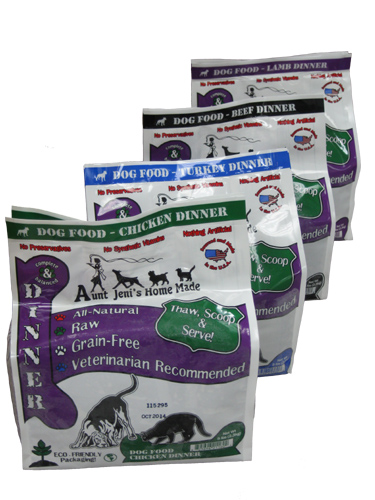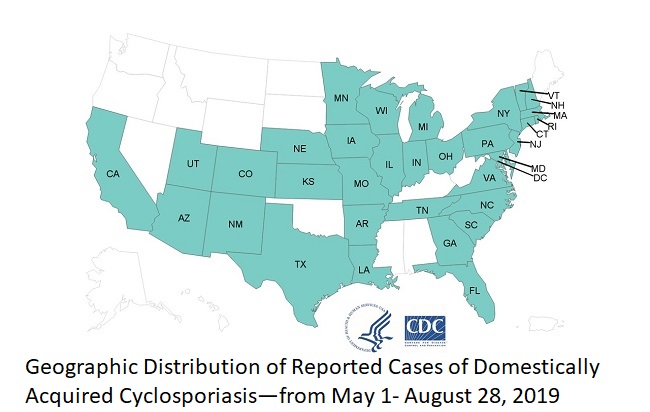The FDA is cautioning pet owners not to feed their pets certain lots of Aunt Jeni’s Home Made frozen raw pet food after samples from some of these lots tested positive for Salmonella and/or Listeria monocytogenes. Two samples of finished product (Aunt Jeni’s Home Made, Turkey Dinner Dog Food, 5 lb, and Aunt Jeni’s Home Made, Chicken Dinner Dog Food, 5 lb) collected during an inspection of their facility tested positive for Salmonella, and/or L. monocytogenes. Aunt Jeni’s Home Made pet food products are sold frozen online and through retail locations. Because these products are frozen, FDA is concerned that people may still have them in their possession. @ https://www.fda.gov/animal-veterinary/news-events/fda-cautions-pet-owners-not-feed-certain-lots-aunt-jenis-home-made-frozen-raw-pet-food-due?utm_campaign=8-30-2019-AuntJeni&utm_medium=email&utm_source=Eloqua
ruth
FDA is cautioning pet owners not to feed their pets certain lots of Aunt Jeni’s Home Made pet food after samples tested positive for Salmonella and/or L. mono.
Andrea-M
The number of reported cases of domestically acquired Cyclosporiasis remains high in the United States since May 1, 2019. According to the CDC, in previous years the reported number of cases of Cyclospora peaked between June and July, although some case we reported as late as September. This year, Cyclospora season is showing no signs of ending early, and as of August 28, 2019, 1,696 laboratory-confirmed cases of cyclosporiasis were reported to CDC by 33 states, District of Columbia and New York City in people who became ill since May 1, 2019. At least 92 people were hospitalized; no deaths were reported. At this year, multiple clusters of cases associated with different restaurants or events are reported by state public health authorities, CDC, and FDA. Some of the cases are related to an outbreak linked to infection from fresh basil imported from Mexico. The lack of validated molecular typing tools for C. cayetanensis makes it difficult to tie individual cases to the outbreak. @ https://www.cdc.gov/parasites/cyclosporiasis/outbreaks/2019/a-050119/index.html
CDC and federal, state, and local public health partners are investigating an increase in reported cases of Cyclospora infection (cyclosporiasis). Reports of cases tend to increase during summer months in the United States.
ruth
CDC, FDA, and several states are investigating the Salmonella outbreak linked to pig ear dog treats. Several Salmonella strains, including Cerro, Derby, London, Infantis, Newport, Rissen, and I 4,[5],12:i, were isolated from this outbreak. As of August 26, 2019, a total of 143 people from 35 states were infected with the outbreak strains of Salmonella. Of 110 ill people with information available, 30% have been hospitalized. No deaths have been reported. Antibiotic resistance to several antibiotics was found. Evidence indicates that contact with pig ear dog treats is the likely source of this outbreak. Of 100 ill people, 88% reported contact with a dog before getting sick. Of 80 people with available information, 70% reported contact with pig ear treats or with dogs that were fed pig ears. Testing identified Salmonella in over 90 samples, with many different strains. Some of pig ears were imported from Argentina, Brazil, and Colombia. Some product labels indicated As we reported in the News several companies have recalled pig ears due to Salmonella. @ https://www.cdc.gov/salmonella/pet-treats-07-19/index.html
Outbreak of Salmonella Infections Linked to Pet Treats
Dan-W
A new method to detect big six Shiga toxin-producing Escherichia coli in Apple Juice within one shift
The J Food Protection published an article describing a new method to detect Shiga toxin-producing Escherichia coli (STEC) in foods. The method is capable of detecting serotype O157:H7 one of six non-O157 serogroups, O26, O45, O103, O111, O121, and O145, termed “The Big Six.” The STEC bacteria were isolated from unclarified apple juice by a centrifugation step with the use of an immunocupture technique to minimize contaminants (such as pectin and polyphenols that may co-purify with DNA) that may interfere with DNA amplification efficiencies and limit sensitivity. The immunocupture method was followed by PCR of the Shiga toxin genes stx1a and stx2a. The new method did not involve any culture enrichment and allowed detection of <5 CFU Big Six STEC. The method could be completed in 6.5 h. Inclusivity and exclusivity were tested with 52 Big Six STECs and 30 unrelated strains. @ https://www.ncbi.nlm.nih.gov/pubmed/31414899
J Food Prot. 2019 Sep;82(9):1512-1523. doi: 10.4315/0362-028X.JFP-19-134.




